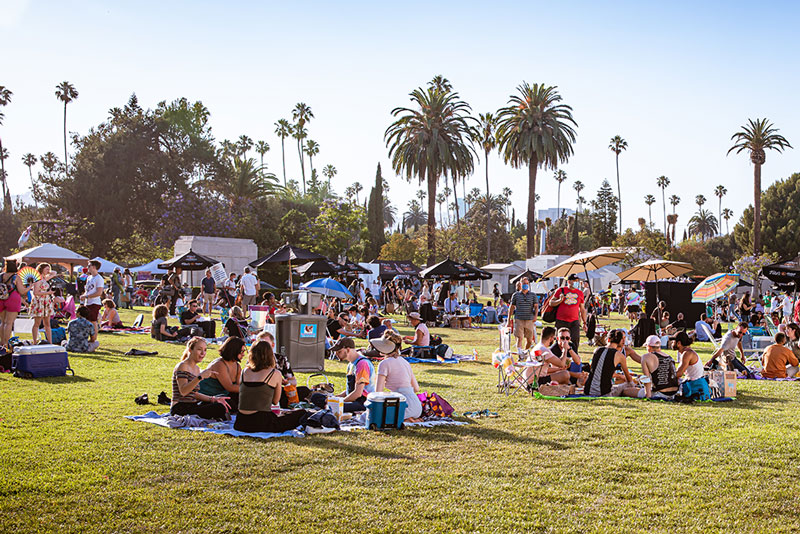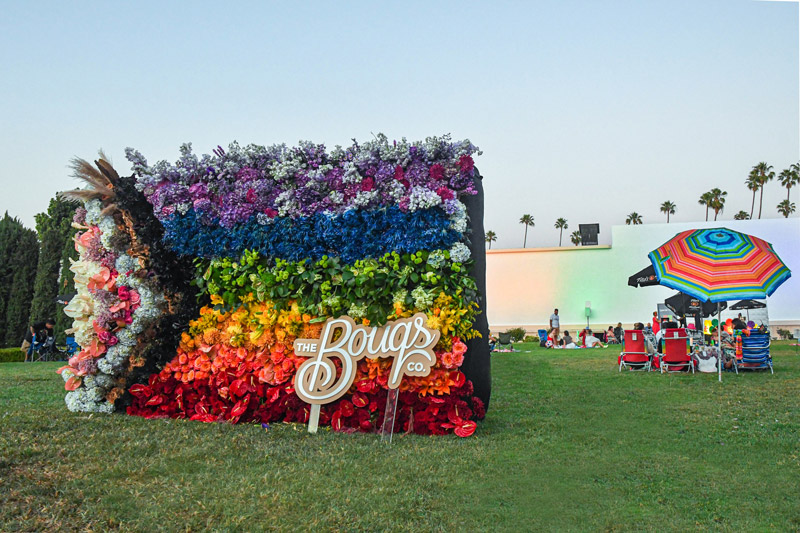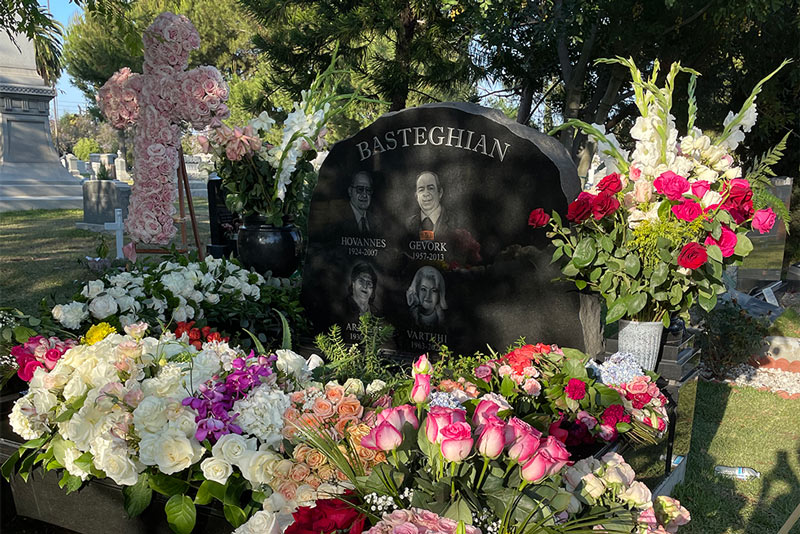After a month of celebrating LGBTQ+ people and raising awareness, it’s important to remember that every month is the right time to recognize the contributions of LGBTQ+ people and support equality and anti-discrimination around the world. Who you love or how you identify yourself should never be the reason for bigotry and abuse. Kindness, community, and human rights are integral values for The Bouqs Co. so we were proud to team with the Los Angeles LGBT Center this year to celebrate Pride.
Flowers help build connections and communities so we expanded our limited-edition Pride collection. We created a set of bouquets inspired by various flags including the Lesbian Pride Flag, Transgender Pride Flag, and Bi Pride Flag. We generated over $15,000 in donations for the Los Angeles LGBT Center through our limited edition bouquets. We were also proud to help sponsor the Los Angeles Pride Picnic with a stunning floral installation.
Los Angeles Pride Picnic 2021

On June 27th, the Los Angeles LGBT Center hosted the 2021 Pride Picnic on the lawn at Hollywood Forever Cemetery, a favorite and unique location for outdoor events across Los Angeles. The Bouqs proudly sponsored a special flower installation for this year’s Pride Picnic. With the country re-opening, events like the Pride Picnic serve as a great way to start re-integrating with face-to-face socializing.
From the Los Angeles LGBT Center: “Pride Picnic, the Center’s first in-person event in over a year! We couldn’t have brought the community together to dance, celebrate and enjoy the sunshine without you. Pride Picnic had completely sold out one week before the event date and the day of we reached capacity at 1,000 guests.”
The Flower Installation at the Pride Picnic

The Bouqs was proud to sponsor the amazing floral installation used at the Pride Picnic at Hollywood Forever. Designed by Los Angeles florist The Boy Who Cried Flowers with flower selection and quantities provided by The Bouqs’ lead floral designer Kaylyn Hewitt, the flower installation beautifully depicted the Pride Progress Flag.
Pride Picnic Flower Installation Stats
Red Stems: 648
Roses, Mums, Carnations, Garden Roses, Amaranthus, Anthurium
Orange Stems: 576
Lilies, Carnations, Roses, Garden Roses, Snapdragon (peach), Ranunculus, Mums, Anthurium
Yellow Stems: 504
Solidagos, Mums, Ranunculus, Snapdragons, Garden Roses, Roses
Green Stems: 504
Amaranthus, Hydrangeas, Anthurium, Roses, Carnations, Poms, Queen Annes (Ammis), Dianthus, Lemon Leaf
Blue Stems: 726 (576 royal blue and 150 baby blue)
Thistles, Delphiniums, Mums, Hydrangeas
Purple Stems: 648
Liatris, Limonium, Callas, Mums, Roses, Lisianthus, Hydrangeas
Pink Stems: 150
Rose, Solomios, Limonium, Mums, Ranunculus, Snapdragon
White Stems: 336
Lisianthus, Lilies, Dianthus, Roses, Hydrangeas, Baby’s Breath
Black Stems: 150
Callas, Roses, Anthurium
Brown Stems: 150
Anthurium, Roses, Tropical Dried Flowers
Q&A with the Los Angeles LGBT Center
1. Historically, some LGBTQ+ individuals experience insecurity around shelter and stability. Where can I get support as an LGBTQ+ person around finding housing or food?
The Los Angeles LGBT Center provides emergency beds, when available, for youth between the ages of 18-24. On any given day there are 6,000 youth living on the streets of Los Angeles—40% of them identifying as LGBTQ. We provide critical drop-in services to all youth who show up at the doors of our flagship Anita May Rosenstein Campus in Hollywood—regardless if we’re able to temporarily house them—including three hot meals a day; fresh clothing; support groups; a charter high school, GED and college prep program; an employment preparation, training, and placement program; independent living skills building; medical care; counseling; and whatever support they need to get off the streets.
On the other side of the spectrum, local LGBT seniors disproportionately experience food insecurity and a lack of affordable housing. They are less likely, compared to their heterosexual counterparts, to have children or grandchildren to support them and twice as likely to live alone. To alleviate some of the barriers experienced by both youth and seniors, the Center’s unique Culinary Arts program prepares 400 to 600 free delicious boxed lunches daily, and, later this year, the Center will open The Ariadne Getty Foundation Senior Housing which contains 99 affordable housing units.
In April 2020 the Center made efforts amid the COVID-19 pandemic to address food insecurity within the community by opening the Pride Pantry food bank which distributes boxes of dry goods, fresh produce, and other perishables on a weekly basis. Food distribution takes place at several Center locations: the flagship Anita May Rosenstein Campus in Hollywood; Mi Centro in Boyle Heights; and Center South in South Los Angeles near Leimert Park. Home delivery of groceries to seniors’ homes is available through the Center’s volunteer-driven Senior Angeles program.
For LGBTQ people experiencing food insecurity and homelessness outside of Los Angeles, we encourage them to get in touch with the nearest LGBT center for help. CenterLink is an international nonprofit organization that includes membership of LGBTQ centers, including the Los Angeles LGBT Center, serving their local communities. By contacting CenterLink at lgbtcenters.org, you will gain access to vital information and resources provided by your local LGBT center.
2. Is there anywhere I can go to get help with my health as an LGBTQ+ person?
The Los Angeles LGBT Center is the nation’s largest and most experienced provider of LGBT medical and mental health services, All of our services are free or low cost and available to anyone who walks through our doors. We’re also one of the few Federally Qualified Health Centers in the nation with providers who specialize in primary care for LGBT people and with a research team working to advance the care and treatment of people in our community. Additionally, we offer HIV/AIDS care, transgender healthcare, mental health counseling, addiction-recovery treatment, and a clinical research program. Our health centers can be found throughout Los Angeles to meet the needs of different neighborhoods and its LGBT residents: Center WeHo in West Hollywood; Trans Wellness Center in Koreatown; Center South in South L.A. near Leimert Park; and at Mi Centro in Boyle Heights.
For LGBTQ people who live outside of Los Angeles and want to find a medical provider who understands their needs, we suggest talking to your friends and other members of your community to get recommendations because chances are, they too have researched and found which medical providers they feel most comfortable with.
3. Reports indicated that transgender persons experience a high rate of sexual abuse and assaults. What do you think we, as a community, can do to help reduce this rate of violent crime?
There are many ways to protect and support members of the trans community. Here are a few suggestions to keep in mind:
- Violence is a learned behavior. It can be unlearned. Examine who is perpetrating the violence. Trans people are targeted by our neighbors, our coworkers, our relatives, and others. Talk to your community about respecting transgender people. Unfortunately, many people still feel shame in their attraction to trans people and may retaliate with violence if they are outed as a trans-attracted person. It is important to normalize and render visible healthy relationships with transgender people.
- Believe Survivors. Provide survivors with the tools they need to advocate for themselves. Support survivors with their needs. Link survivors with competent services. Provide financial support to relocate and secure independence from their abuser.
- Safety Plan. Link survivors with community advocates who can ensure safety for the survivor. Prioritize community-based advocates, consider police as a last resort or emergency.
- Know Your Rights. Reinforce and spread awareness about the rights of survivors and victims.
- Denounce harmful behaviors and uplift healing and care. Our cultural values inform the individual’s behaviors. We must continue to amplify this message that violence against trans people is no longer acceptable.
- Advocate for increased protections in policy and inclusion in violence intervention work. Speak up even if there are no visible trans people in the room. Ensure that your local movements are including trans people in their organizing.
- Build and support coalitions with community-based organizations. Invite experts in violence prevention and response who are culturally competent to speak with your constituents. Engage with CBOs and incorporate their messages into your work. Talk about violence prevention all year round. We need a multidisciplinary approach.
- Prevention is long-term and intergenerational. Examine your social networks across generations. Are you fostering a safe environment to learn? Talk to your networks about consent, sexual health, and gender diversity.
- Trauma-informed prevention and intervention will save lives. Trans people are often burdened with a lifetime of trauma. Continue to educate yourself about our needs and unique challenges.
- Diversity, Equity, and Inclusion Training is critical. Often trans people have to educate their service providers about their identity. Trans survivors are more likely to experience revictimization and trauma, especially if their service provider is not aware of the unique challenges trans people face in accessing services.
4. In what ways can individuals become more proactive in their support for LGBTQ+ rights around the world?
- To advance the rights of LGBT people in the U.S. and globally, we encourage activists to participate in the Center’s Emerging Leaders Program in which staff work directly with activists from different countries and provide technical and financial assistance in order to build and strengthen the burgeoning LGBT movement in these countries. Please donate to our Emerging Leaders Program, refer international LGBT activists who could benefits from our program, and participate in global advocacy action to stand in solidarity with our comrades.
- Another way to support the LGBT movement is to volunteer at the Center or at their local LGBT organization. The Center is able to thrive because of our amazing volunteers. In 2020 the Center’s volunteers dedicated a whopping 32,000 hours of their time during a turbulent and unpredictable year! For information about our volunteer opportunities, visit lalgbtcenter.org/volunteer.

5. Why did you choose a cemetery as the venue for the Pride picnic? Does Hollywood Forever have some history that is relevant to the mission of the Los Angeles LGBT Center?
The Hollywood Forever’s Fairbanks Lawn is the perfect space for large gatherings within an intimate environment. The iconic cemetery has been our preferred venue to host our other signature events, such as the premier food and wine event Simply diVine and our annual outdoor film screening known as OUT Under the Stars. Plus, the owner of Hollywood Forever is a former member of the Center’s Board of Directors, and we are grateful for his generosity.
We’re thrilled that our inaugural Pride Picnic was a sold-out success! Following a year of social distancing and quarantining, Pride Picnic was the ideal celebration to show our strength and love as a community.
Shop All



